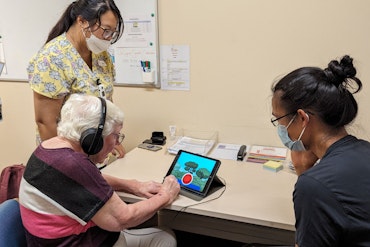Researchers discover why some people’s brains aren’t impaired by ageing
Why do some people experience cognitive decline in later life whereas others appear fine?
![<p>When we get sick, our body fights back against disease. Does the brain do the same against dementia? [Source: Shutterstock]</p>](https://agedcareguide-assets.imgix.net/news/articles/wp/brainbattlesback__0702.jpg?fm=pjpg&format=auto&w=550&q=65)
When we get sick, our body fights back against disease. Does the brain do the same against dementia? [Source: Shutterstock]
Key points:
- In 2024, it is estimated there are more than 421,000 Australians living with all forms of dementia
- Without a medical breakthrough, the number of people with dementia is expected to increase to more than 812,500 by 2054
- More than two-thirds of aged care residents have moderate to severe cognitive impairment
Dementia is set to become the leading cause of death in Australia, as the prevalence will increase as per the ageing population, overtaking heart disease which is currently the leading cause of death.
Researchers have revealed the strongest evidence to date that the brain manages to adapt to age-related deterioration by recruiting other areas to make up for cognitive decline.
It’s not fully understood why some people appear to maintain better brain function than others and how people can protect themselves from cognitive decline, however, the World Health Organisation has published 12 guidelines for risk reduction.
As people age, their brains occasionally atrophy and lose cells, leading to a reduced ability to function. People were commonly thought to manage cognitive decline through ‘recruiting’ other parts of the brain to make up for weakened cognitive abilities as diseases, such as Alzheimer’s disease, impact performance in day-to-day life.
Scientists from the University of Cambridge were able to show that the brain does recruit other regions of the mind to compensate for cognitive decline and how that actually determines performance through the use of brain studies.
A team led by researchers at the University of Cambridge in collaboration with the University of Sussex have published their findings in the journal eLife, noting that this difference in performance — specifically in the brains of older people — is significant.
Study lead Dr Kamen Tsvetanov, an Alzheimer’s Society Dementia Research Leader Fellow in the Department of Clinical Neurosciences, University of Cambridge, said this ability to ‘recruit’ other regions of the brain could explain differences in how people age.
“Our ability to solve abstract problems is a sign of so-called ‘fluid intelligence,’ but as we get older this ability begins to show significant decline. Some people manage to maintain this ability better than others,” Dr Tsvetanov said.
“We wanted to ask why that was the case — are they able to recruit other areas of the brain to overcome changes in the brain that would otherwise be detrimental?”
Brain imaging studies have shown that fluid intelligence tasks engage the ‘multiple demand network,’ a brain network involving regions both at the front and rear of the brain, but its activity is known to decrease with age.
The Cambridge team looked at imaging data from 223 adults between 19 and 87 years of age, who had been recruited by the Cambridge Centre for Ageing & Neuroscience, to see how the brain managed to combat decline.
The volunteers were asked to identify the ‘odd one out’ in a series of puzzles of varying difficulty while lying in a functional magnetic resonance imaging scanner, so that the researchers could look at patterns of brain activity by measuring changes in blood flow.
Generally, the ability to solve problems decreased with age. The volunteers’ MDN was particularly active, as were regions of the brain involved in processing visual information.
When the team analysed the images further using machine-learning, they found two areas of the brain that showed greater activity in the brains of older people and also correlated with better performance on the task. These areas were the cuneus, at the rear of the brain and a region in the frontal cortex.
Older adults often have a harder time briefly remembering information that they have just seen, like the complex puzzle pieces used in the task. Researchers speculated that increased activity in the cuneus might reflect a change in how often older adults look at these pieces, as a strategy to make up for their poorer visual memory.
Dr Ethan Knights from the Medical Research Council Cognition and Brain Sciences Unit at Cambridge said that further research was needed to determine why this occurs in some older people and some tasks, but not others.
“Is there something special about these people — their education or lifestyle, for example — and if so, is there a way we can intervene to help others see similar benefits?” Dr Knights said.
Dr Alexa Morcom from the University of Sussex’s School of Psychology and Sussex Neuroscience Research Centre explained the significance of the study for ageing well.
“This new finding also hints that compensation in later life does not rely on the multiple demand network as previously assumed, but recruits areas whose function is preserved in ageing,” Dr Morcom said.
In 2024, it is estimated that more than 1.6 million people in Australia are involved in the care of someone living with dementia.
How do you keep your brain sharp in later life? Let the team at Talking Aged Care know and subscribe to the newsletter for more information, news and industry updates.
Related content:
How does ageing affect the ability to remember?























